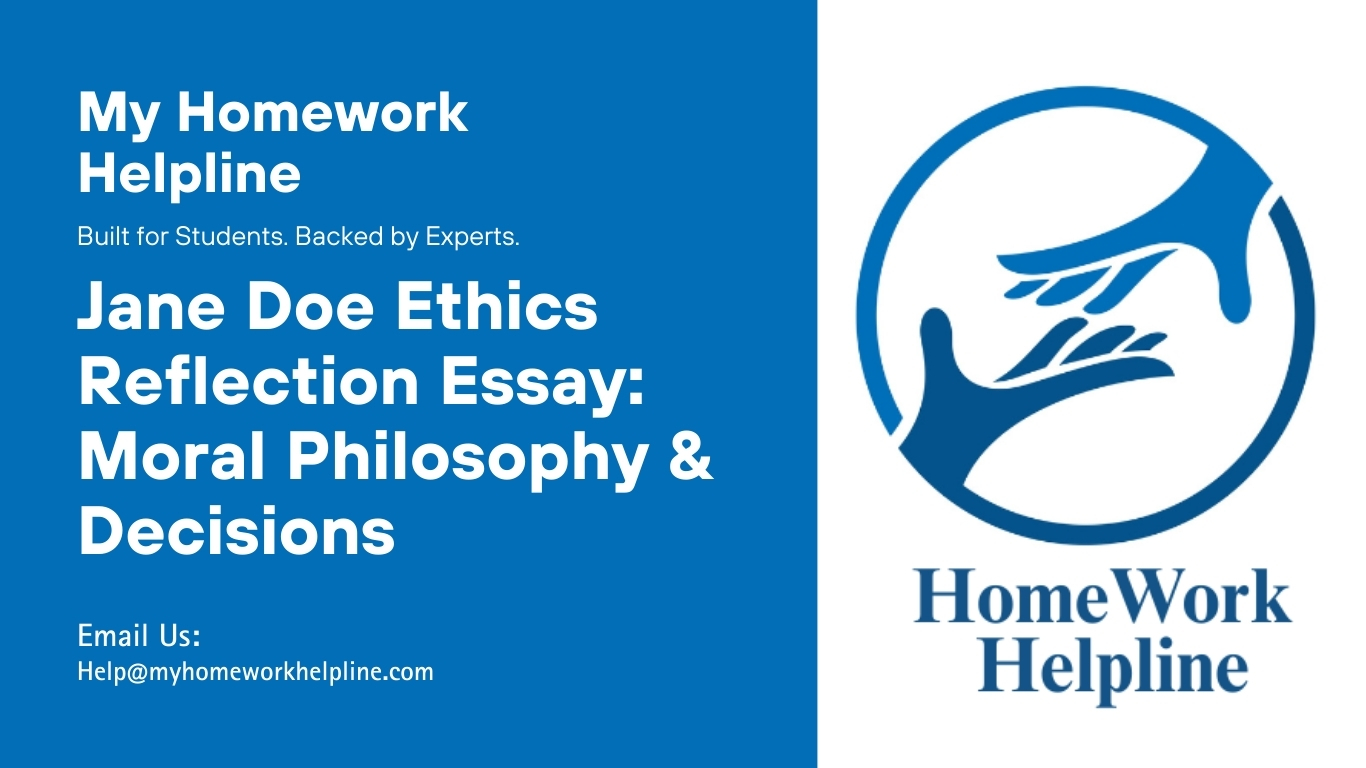Jane Doe Ethics Reflection Essay: Personal Moral Philosophy Analysis
Having had the opportunity to learn ethics formally, I now understand the importance of acting morally. I have been able to explore different scenarios and dilemmas to try and gauge my understanding of ethics. I believe that everyone should be provided with the opportunity to live their lives, and should not be judged for the choices they make, because everyone makes bad decisions. Therefore, I should be able to do what I want to do in life, as long as it makes me happy and causes no harm to others.
The philosophy is derived from virtue ethics. Virtue ethics is a moral theory that is centered on the role one’s character plays and the virtues involved in determining an action’s rightness (Slote, 2020). The theory offers an account of wrong and right depending on what a virtuous agent would do, and it explains that an action is right if it is determined that the virtuous person would do it.
Struggling with ethics essays or assignments on moral philosophy like Jane Doe’s case? Our Law Homework Helpline provides expert homework assistance and academic support. From reflective essays to ethical case analyses and custom assignments, our specialists deliver high-quality guidance that meets academic standards and deadlines. Get professional essay help today and improve your grades with expertly crafted, original academic support.
The reason my philosophy aligns with the theory is that it allows me to be happy while being mindful of those around me, which I believe is the character of a virtuous person. I created the personal philosophy to give me some degree of clarity and direction while living my daily life. I believe that striving to be happy without harming others is important because it helps guide my decisions, while also optimizing and improving my mindset. The precepts for the philosophy include refraining from lying, refraining from stealing, refraining from causing harm to others, and refraining from elevating the self and blaming others.
My personal philosophy applies to virtue ethics and utilitarianism. The reasons include, virtue ethics values being good more than being right, which allows me to be happy as long as I do not cause harm to others. Additionally, utilitarianism advocates for actions that foster pleasure or happiness while opposing action that causes harm or unhappiness, therefore, the theory applies to my philosophy because it encourages actions that foster pleasure and happiness.
In the case of Jane Doe, her actions are unethical.
The reason is her actions do not contribute to the development of her virtuous character but it is based on desperation (Angier, 2018). Additionally, if she qualifies to be a registered nurse, she will be under-skilled hence unfair to the people she will be serving. Some of her actions are less grave instances of ethical transgressions than others such as uploading a blank paper and plagiarizing her own work. The more grave instances include paying a worker at Papering.com to get her paper done, translating an entire article from Esperanto into English, and plagiarizing an entire work published on website.com.
I propose that we raise awareness of the personal value in schools. Advocating for personal values in schools can be carried out through educating the students to work genuinely, as well as, being respectful and honest about their work. Personal values are instrumental to students as they allow them to define what they want in life, enabling them to be fulfilled and happy. The values are also the guiding principles of a person’s life. Examples of personal values include dependability, courage, integrity, gratitude, and sustainability.
Advocating for personal values will be based on principles of ethical egoism since students will be taught to make ethical decisions based on self-interest (Angier, 2018). Ethical egoism is based on the principle that morality is in accordance with the promotion of one’s own good. Therefore, by learning social values, students like Jane will be able to understand their value set; thus, setting broad desirable goals that will motivate their actions and serve as guiding principles in schools. This also discourages unethical behavior and instances of drastic disciplinary actions in schools.
References
Angier, T. P. S. (2018). Aristotle and the Charge of Egoism. The Journal of Value Inquiry, 52(4), 457-475.
Slote, M. (2020). Agent-based virtue ethics. Handbuch Tugend und Tugendethik, 1-10.

